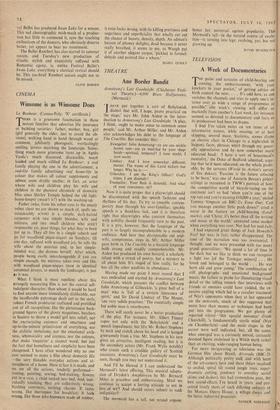CINEMA
THERE is a gruesome fascination in those 1 instant families that advertise life insurance or building societies: father, mother, boy, girl (girl generally the elder, just to avoid the ob- vious), walking hand in hand through wood or common, jubilantly photogenic, everlastingly smiling, jerseys matching the landscape. Some- thing much more gruesome turns up in Agnes Varda's much discussed, discussible, much lauded and much vilified Le Bonheur: a real family playing the one in the advertisement, a real-life family advertising real home-life in colour that makes all colour supplements and admen seem drably unchic; in fact, an actor whose wife and children play his wife and children in the phoniest chronicle of domestic bliss since Shirley Temple helped the old light- house-keeper (wasn't it?) with the washing-up.
Father (who, from his velvet eyes to the manly velvet chest we are shown so much of, spells un- mistakeably ACTOR) is a simple, dark-haired carpenter with two simple blondes, wife and mistress, and two small children who aren't responsible yet, poor things, for what they've been put up to. They all live in a simple suburb and go for woodland pique-niques on Sundays; till one day, suffused with woodland joy, he tells the wife about the mistress and, in her simple- minded way, she drowns herself. After which, people being easily interchangeable if you are simple enough, the mistress takes over and life, with woodland pique-niques (now in identical autumnal jerseys, to match the landscape), is just is it was.
What I think is most repellent about this strangely nauseating film is not the central self- indulgent character, than whom it would be hard to find anyone more immediately dislikeable, nor the insufferable patronage dealt out to the surly, robust French proletariat (softened and prettified out of all recognition, like the picturesque back- ground figures of the glossy magazines, butchers in boaters to throw a model girl into relief), nor the excruciating cuteness and smartness and up-to-the-minute primitivism of everything, nor the stylistic imitations, nor the emotional arch- ness, whimsicality and coyness, nor the colours, that make 'exquisite' a suspect word; but just the fact that homeliness and simplicity have been cheapened. I have often wondered why no one ever seemed to make a film -about domestic life —the very filmable everyday actions and at- mospheres of a home. Here at last it is made, and we see all the actions, tenderly performed— ironing, painting, sewing, bed-making, flowers put in a vase, a child tucked into bed. And, indi- vidually touching, they are collectively wrong. Nothing convinces, nothing charms. It tastes wrong, like meringues for breakfast; it feels wrong, like those joke-hammers made of rubber;
it even looks wrong, with its killing prettiness and sugariness and superficiality that wholly cut out the chance of beauty, density, depth. An adman's heaven of phoney delights, dead because it never really breathed, it seems to me, as Waugh put it of another elegant corpse, 'pickled in formal- dehyde and painted like a whore.'
















 Previous page
Previous page